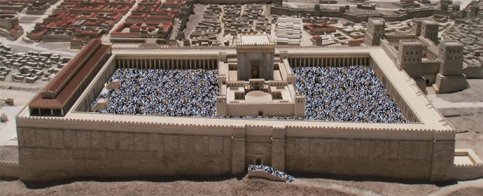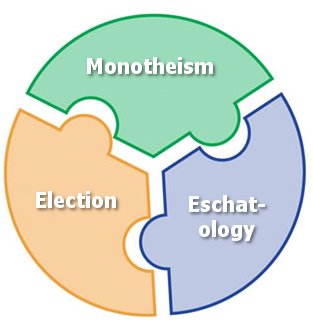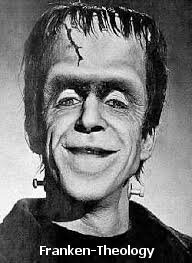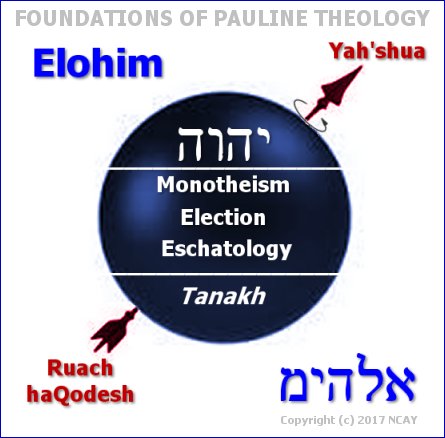Month 10:12, Week 2:4 (Revee/Shavu'ot), Year:Day 5940:278 AM
2Exodus 3/40, Yovel - Year 50/50
Gregorian Calendar: Tuesday 10 January 2017
The Word Made Flesh
IV. Paul & Second Temple Judaism

Continued from Part 3
The Heart of Pauline Scripture
To study Paul meaningfully and in depth, particularly in seeking a clear understanding of his teaching on the deity of Messiah, we must first appreciate his system of thought and the way the Ruach haQodesh (Holy Spirit) brings multiple streams together and then knits them into an extraordinarily beautiful whole or echadness. I work on the assumption laid out by Ernst Käsemann, who said:
"Until I have proof to the contrary I proceed on the assumption that the [Pauline] text has a central concern and a remarkable inner logic..." [1].
Paul's 'Sun'
The 'central concern' is starkly obvious. Though in Paul's world there were "many 'gods' and many 'lords'" (1 Cor.8:5, NIV), whenever he used the word 'Elohim' (Heb.) or Theos (Gk.) he was, without exception, referring to the One and only Divinity and Creator in the Cosmos, the same One who had entered into a b'rit (covenant) with Israel in the days of Moses, whose Name is Yahweh. If there is a central object in his theological 'solar system', this is its 'sun' around which everything turns.
An Invitation to Exegesis
Put another way, this is an invitation to exegesis, the critical (in a positive way) explanation or interpretation of a text. We shall begin by looking at Paul's theological background which was the theology of Seccond Temple Judaism, the religious matrix in which he was birthed, raised and in which he served.
The Importance of Understanding a Writer's Background
Every writer, both inspired and uninspired, has such a background so in reading a particular writing extensively it is usually possible to determine when it was written and sometimes where. My own writings have inevitably been influenced to some degree by the different streams of though I have meandered through in my search for emet (truth). It is impossible to list them all, and even the exercise can be detrimental because people will conclude that because your journey was through this or that terrain that you necessarily 'absorbed' or 'incoporporated' that terrain in your thinking processes and thereby became corrupted.
The Systems I was Exposed To
For example, I was born in the 1950's and grew up in the 1960's and 70's though I was isolated from most of the Western currents of that time by virtue of my being born and raised in the Orient and being exposed to Malay Islam, Chineses Buddhism, Indian Sikhism and Hinduism and European Protestantism and Catholicism. Certainly the way of thinking was a mixture of Anglicanism and secularism but within a pecular matrix of different systems of thought providing all sorts of mirrors with which to view and interpret the world. Paul too had, as I have mentioned, a multicultural exposure whilst maintaining the core of his parents' Judaism. Yet, as we will see, that core substantially shifted, as did my own Anglican one, in the light of revelation and experience. Secularism, Darwinism, Buddhism (again), Conservative and Liberal Restorationism, Kabbalism, Evangelical (largely Baptist and Pentecostal) Protestantism and Messianic Judaism are all major streams I have moved through, picking up truths here and there and discarding the rest.
A. THE THREE CENTRAL ELEMENTS
Down to Paul's Very Core
Paul's core was Second Temple Judaism - it was the theological 'stuff' he had to work out of and from to get where Yahweh wanted him to be, and central to that theology were three core elements:
- 1. Monotheism (out of which issues true Worship);
- 2. Election & Covenant (out of which issue Torah and Soteriology); and
- 3. Eschatology (out of which come redemption and new creation).

The Triple Judahite Lens
All things 'Judahite' were viewed through this triple lens even though, it has now been reasonably well established, there was no systematic theology at the time. Translating these three theological terms into the language of the common people, everything a Judahite believed in and centred his life on consisted of a belief in:
- 1. One Elohim (God);
- 2. One People (Israel); and
- 3. One Israelite future.
A 20th Century Corruption
The belief was simple and potent, so potent, in fact, that one 20th century European dictator adopted and adapted the formula to great (though destructive) effect for his political platform and rallying cry:
- 1. Ein Führer (One Leader);
- 2. Ein Volk (One [German] People); and
- 3. Ein Reich (One [German] Empire [and future]).
Proper Theology is Beyond Reductionism
These three core Judahite beliefs coalesced as one echad because they could not be separated from one another. There was a relationship between them that constituted, as it were, a 'fourth element', with the 'whole' therefore being more than the 'sum of its parts'. You cannot apply reductionism to theology any more than you can to biology - you cannot dissect an organism into its constituent parts and expect to understand it from the parts alone because there is something else called 'life' or 'consciousness' which binds all those parts together to make it living.
Avoiding Franken-Theology
 Likewise to do proper theology you cannot play the Jehovah's Witness game of 'scriptural ping-pong', pulling one scripture out from here and another from there and then artifically gluing them together to create a 'system'. What you end up with is a Frankstein-type monster or 'Franken-theology'. And unfortunately the Witnesses aren't the only people calling themselves Christians (or Messianics) who do this. It seems to be ubiquitous and is the reason, especially with the advent of online social media that gives everyone a voice, so much destructive 'pop theology' has arisen. The result is a vast range of theological franken-burgers full of artifical additives and animal left-overs (the franken-thinking of human wisdom) which constitute our 34,000+ denominations. This is why we have to do theology, do it well, keep it as simple as possible without watering it down to a lukewarm slush, and get rid of all the human 'additives'.
Likewise to do proper theology you cannot play the Jehovah's Witness game of 'scriptural ping-pong', pulling one scripture out from here and another from there and then artifically gluing them together to create a 'system'. What you end up with is a Frankstein-type monster or 'Franken-theology'. And unfortunately the Witnesses aren't the only people calling themselves Christians (or Messianics) who do this. It seems to be ubiquitous and is the reason, especially with the advent of online social media that gives everyone a voice, so much destructive 'pop theology' has arisen. The result is a vast range of theological franken-burgers full of artifical additives and animal left-overs (the franken-thinking of human wisdom) which constitute our 34,000+ denominations. This is why we have to do theology, do it well, keep it as simple as possible without watering it down to a lukewarm slush, and get rid of all the human 'additives'.
Wrong Emphases Leads to Distortion
 As we look at Paul's writings we will see that his theology basically reduces to these three categories, each of which he expands and develops in the light of the revelation of Yah'shua the Messiah (Jesus Christ). To both do theology well and live the Besorah (Gospel) as a whole, all three categories matter very much. What tends to happen - which seems to be an unfortunate trait of the fleshy nature - is to home in on one of these and emphasise it to the detriment or exclusion of the others. Thus you will not uncommonly find messianics zooming in on Election, Covenant and Torah, one group of Evangelicals on Worship and another on being a New Creation. The thing is, they're all important and if you negelct any one, you end up with a distortion of the Besorah (Gospel) and open the door to false doctrine and deceiving spirits. Remember, there is nothing original in Satan - he simply distorts and twists 'what already is' - and that is how denominationalism arises. It's how Mormonism, Calvinism, Messianism, and all the other '-isms' came into being.
As we look at Paul's writings we will see that his theology basically reduces to these three categories, each of which he expands and develops in the light of the revelation of Yah'shua the Messiah (Jesus Christ). To both do theology well and live the Besorah (Gospel) as a whole, all three categories matter very much. What tends to happen - which seems to be an unfortunate trait of the fleshy nature - is to home in on one of these and emphasise it to the detriment or exclusion of the others. Thus you will not uncommonly find messianics zooming in on Election, Covenant and Torah, one group of Evangelicals on Worship and another on being a New Creation. The thing is, they're all important and if you negelct any one, you end up with a distortion of the Besorah (Gospel) and open the door to false doctrine and deceiving spirits. Remember, there is nothing original in Satan - he simply distorts and twists 'what already is' - and that is how denominationalism arises. It's how Mormonism, Calvinism, Messianism, and all the other '-isms' came into being.
Evangelical Emphasis on Salvation Theology
Most students of the Pauline writings tend to focus on Soteriology or Salvation Theology (Category #2) and consequently this is very well developed in Evangelical Protestant circles, if somewhat distorted on occasion because of its over-emphasis at the expense of the other important categories. Election/Salvation, however, can only be properly and fully understood within the larger frame of beliefs about the one Elohim (God) and the promised future - and the particular problem of good and evil which only becomes fully illuminated once the reality of the one Elohim (God) has been seen.
Divine Juxtaposition
Each of these three categories - monotheism, election and eschatology - have historically generated controversy because they are complex. But once you zoom in on what these themes meant to a first-century Pharisee, we see that they form a tightly integrated whole: one Elohim (God), one people of Elohim (God), and one future for Israel and the whole world. Each is juxtaposed or kept in place by the other two and each is partly defined in relation to the others.
Two Main Conclusions About Paul
As we examine Paul's B'rit Chadashah (New Covenant) writings in the light of these three categories there two inescapable conclusions:
- 1. Paul remained a wholly Judahite (Jewish) thinker; and
- 2. These three categories cover the main things he was talking about.
New Truth Leads to Revision of the Big Picture
In other words, he wasn't inventing new categories but rather revising them in the light of new emet (truth), finding and disclosing a fresh understanding of the Divine Puposes and so, in the process, gaining a fresh hermeneutical (interpretative) principle. In other words, whatever it was that happened to him on the Damascus Road, Paul did not reject everything about the Hebrew way of life and thought - he did not invent a new scheme, a new religion, or anything that Christians (approvingly) and Messianics (condemningly) have accused him of doing. What, instead, we find Paul doing is revising and transforming his existing Second Temple Hebraic worldview and theology in the light of one major revelation in his life - the revelation that the crucified Yah'shua the Messiah (Jesus Christ) had been raised from the dead. He stayed on the Hebrew map, he did not wipe that map off the table and replace it with something quite different...some non-Hebrew revelation. He remained fully 'messianic' and 'hebraic'.
B. REMODELLING AROUND YAH'SHUA
A New Controlling Paradigm
It is my belief, first proposed by N.T.Wright in 2005 and as shown in the apostle's writings themselves, that Paul took the three central Second Temple categories and rethought, reworked and reimaged them around Yah'shua the Messiah (Jesus Christ), on the one hand, and around the Ruach haQodesh (Holy Spirit) on the other. Or as Wayne Meeks puts it:
"The belief in the crucified Messiah introduces a new and controlling paradigm of God's mode of action" [2].
Three Shema's-in-One
The result may be said to be three Shema's which are now fused together as an echad or one composite or 'filled up' Shema by virtue of the Father being in the Son and vice versa per pro the Johannine High Priestly Prayer (Jn.17):
- 1. The Tanakh Torah Shema of Yahweh the Father;
- 2. The B'rit Chadashah Shema of Yah'shua (Jesus) the Son; and
- 3. The B'rit Chadashah Shema of the Ruach haQodesh (Holy Spirit).
The theological horizon of the earlier pre-Christian monotheism is at once enlarged fractal-like to reveal a previously hidden glory though a handful of those who walked with Yahweh in earliest times knew it:
"Our father Abraham rejoiced at the thought of seeing My day; he saw it [by revelation] and was glad" (John 8:56, NIV).
 The theological horizon is like an ever expanding fractal
The theological horizon is like an ever expanding fractal
C. DISSECTING THE COMPLEX
The Three Refinement Processes
Abraham must have glimpsed, in part, at what would be revealed to the apostle. This christologically (pertaining to Messiah) and pneumatologically (pertaining to the Ruach/Spirit) redefined complex of monotheism, election and eschataology was directed by Paul, in conjunction with his prayer life and pastoral labour, in three further ways:
The Messianic Communities
- 1. The planting and watering of messianic communities (assemblies, fellowships, congregations, churches) which would spiritually and collectively be "in Messiah" in Asia Minor (modern Turkey), Greece and Italy (as well, in my view, in Gaul/France, Spain and Britain [3]);
Reworking the Triple Core Around Yah'shua and the Ruach
- 2. Paul, in his writings, takes the monotheism, election and eschatology of the Tanakh (Old Testament) and through the revelation of the Ruach (Spirit) reworks them around the Person of Yah'shua the Messiah (Jesus Christ), on the one hand, and on the Ruach haQodesh (Holy Spirit) on the other, thus introducing a new controlling paradigm of Elohim's (God's) mode of action, out of which shine forth a deepening awareness of the Heavenly Ways. Thus we come to discover and see:
- a. How Yah'shua (Jesus) becomes the personal revelation-in-action of Israel's Elohim (God);
- b. Yah'shua's (Jesus') messiahship in a new and deepened way;
- c. New insights of what it means to be the 'Israel' of the one Elohim (God) in the New Covenant as 'Messianic Israel';
- d. How the Ruach (Spirit) becomes the Presence of the Living Elohim (God) in the New Temple which is the Body of Messiah; and
- e. How the Ruach (Spirit) becomes the agent of Covenant Renewal.
The Shock of a Crucified Messiah and the Divine Heavenly Family
These are dense, interlocking themes, all of which uniquivocally emphasise Paul's theological location and starting point within Second Temple Judaism. They not only clearly spell out the implications of monotheism but explain how the unified purpose of Yahweh-Elohim through history effortlessly incorporates the new-to-Judaism concept of a crucified Messiah within it, even though this same Second Temple Judaism had been expecting a Divine Messiah. What they weren't expecting was a crucified and resurrected Divine Messiah or that the Ruach (Spirit) would be poured out in a fresh and hitherto unexperienced way (the Shavu'ot Anointing). The boundaries of who Elohim (God) really is, and what He desires to do for His people, were pushed to new (and for some hidebound by fossilised tradition) and exciting realisations in the minds of the covenant people. They were learning what Elohim (God) actually meant when He said that He was echad (one) - that He was a family after which the human race is patterned in divine tavnith.
Further Directions of the Refined Complex
- 3. This redefined complex of monotheism, election and eschatology is directed by the apostle in three further ways:
Epistle-Writing and Congregation-Building
- a. It drove and governed the main aims of his letter-writing, and like his praying and pastoral work, was aimed at building messianic communities "in Messiah" across the whole region of first-century Asia Minor (now Turkey), Greece, Italy and beyond;
Messianics Reading the Tanakh Like First Century Judahites
- b. Considering the theological earthquake he was causing, you would expect to find a running debate occurring between the 'old' theology of Second Temple Judaism and the 'new' messianic theology, particularly in the way the religious leaders of the time were reading their Tanakh's (Old Testament). It is my thesis that many Messianics in our day are still reading the Tanakh (Old Testament) the way those religious leaders read it 2,000 years ago and that this is why there are, broadly-speaking, two antagonistic mind-sets and two spirits operating in messianic circles. Instead of bringing Messianics and Evangelicals together, they are driving them apart and hindering the very work that Paul was commissioned to do. And it's a reason why so many are turning against Paul and ultimately against the Besorah (Gospel) and the Messiah Himself.
The Galatian Controversy Anew
We see the same modern controversy in the messianic movement erupting in Galatians so there is nothing new going on, just retrograde forces attempting to drag believers back into the lesser light which was long ago superceeded by the greater one. And that is why many messianics, embroiled in this controversy, lose faith in Messiah and return to a modern form of Second Century Judaism. And a few of these lose emunah (faith) altogether because this theology of the rabbis steals their tiqveh (hope) in true salvation. So Paul's reading of Tanakh (Old Testament) Scripture stands in parallel to, and frequently in tension with, the readings taking place in first century Judaism, as in the modern messianic movement.
The Failure of Messianic Atomism
The failure of the messianic movement to address this retrograde exegesis is in part caused by the atomistic or reductionist mindset of the modern messianic talmudists who, like their opportunistic Jewish forebearers, seem incapable of dealing with the larger scriptural wholes, and the cosmic patterns within them (from which Paul draws particular phrases and sentences) and particularly with the larger scriptural narratives which he wants his congregations to inhabit for themselves. In other words, he is frequently using Scripture as a midrash to back up the experiences given him by the resurrected Messiah through the Ruach (Spirit); and
The Pagan Factor
- c. This Pauline theology was in constant engagement with the pagan world of his day. We see this engagement in three principle arenas:
- i. In dealing with the pagan's 'philosopher's quest' or 'dream of genuine happiness' (which drives so much of the philosophy of the post-Christian West, making Paul all the more relevent today), Paul believed that the transforming power of the Besorah (Gospel) upstaged it completely;
- ii. In articulating and encouraging the congregations he started to live with a spirituality and koinonia (fellowship) generated by the Besorah (Gospel), which he saw as the reality to which the 'religious' world of late antiquity vaguely pointed to in its belief of suprahuman forces and intelligences which influenced and affected the oridinary world (a bit like modern New Ageism); and
- iii. In upstaging the imperial dream of a single-world kingdom (the Illuminist New World Order of Globalists being the modern equivalent) he believed in the universal, global sovereignty of Yah'shua (Jesus), as Israel's true Messiah.
D. EXPANDING THE SHEMA
The Divine Plenipotentiary
Paul asks us, as he did of himself in carrying out this astonishing commission to put Messiah into His actual place in monotheism, election and eschatology, to "take captive every thought to make it obedient to Messiah" (2 Cor.10:5, NIV), and in so doing, clearly identifies the Elohim (God) of Moses as the pre-incarnate Yah'shua (Jesus) Himself acting under the toqef (authority), and in the power, of the Most High Elohim (God), Yahweh the Father, as His planetary plenipotentiary [4]. As plenipotentiary He, YAH'shua, bore not only the Father YAHweh's Name, "Yah", but His Elohimhood (Godhood) too. To those on earth subjected to the Cosmic Plenipotentiary, He was Yahweh, He was the Father [5], and total obedience to this Son Yahweh was expected by the Father Yahweh both as pre-incarnate Messiah as well as incarnate - and then resurrected - Messiah.
There is No Other?
The Second Temple Jewish mindset did not - and still cannot - comprehend this. Indeed, they will never be able to understand beyond their current level of perception because they have been blinded by the father of lies (Jn.8:44). All they can do is quote that famous passage in Tanakh which appears to support their Second Temple Judaic mindset which reads:
"I am Yahweh, and there is no other;
I will strengthen you,
though you have not acknowledged Me,
so that from the rising of the sun
to the place of its setting
men may know there is none besides Me.
I am Yahweh, and there is no other"
(Isa.45:5-6, NIV; cp. Dt.4:35; Mk.12:32).
None Besides Nineveh
Therefore, they reason, there can be no Elohim (Yahweh) apart from the singular Person called Yahweh. Therefore, they reason, Messiah Yah'shua (Jesus) cannot be Elohim (God). They understand the Second Temple mindset but they do not understand the biblical one. They do not understand what "none besides Me" or "no other" mean:
"He will stretch out his hand against the north
and destroy Assyria,
leaving Nineveh utterly desolate
and dry as the desert.
Flocks and herds will lie down there,
creatures of every kind.
The desert owl and the screech owl
will roost on her columns.
Their calls will echo through the windows,
rubble will be in the doorways,
the beams of cedar will be exposed.
This is the carefree city
that lived in safety.
She said to herself,
'I am, and there is none besides me'" (Zeph 2:13-15, NIV).
No Greater City
Using the Second Temple Judaic mindset we are forced to conclude that Nineveh was the only city that ever existed, there being "none besides me". Babylon said the same of herself. Was she the only city that ever existed? Of course not. What this turn of phrase is telling us is that Nineveh and Babylon considered themselves incomparable, without rival, on top of the pile, the 'greatest'. They believed that no other city could ever measure up to them.
No Measuring Up to Yahweh
So when Yahweh says that "I am Yahweh, and there is no other" and "there is none besides Me" he is saying, in respect to the Elohim or other elohim (angels, false gods and human rulers), whoever they may be, that they cannot measure up to Him. This is true of the Son as well, thus disproving the 'co-equal' claim made by the Trinitarian formula without disqualifying Yah'shua's (Jesus') Elohimhood. In otherwords, Yahweh being echad (one) does not mean there are not other Persons who are Elohim - it just means that none of them, including Yah'shua (Jesus) the Son and the Ruach (Spirit) as Divine Persons, are not His equal. But, when they are acting under the Father Yahweh's authority, they are to be regarded as jurisdictionally equal by both malakim (angels) and mankind, because the Father has appointed, designated or placed that toqef (authority) on them for now.
The Authority Will Be Given Back
At some point that toqef (authority) will be returned to Him, as Paul himself wrote:
"The last enemy to be destroyed is death. For He (Yah'shua/Jesus) 'has put everything under His feet.' Now when it says that 'everything' has been put under Him (Yah'shua/Jesus), it is clear that this does not include Elohim (God the Father) himself, who put everything under Messiah. When He has done this, then the Son Himself will be made subject to Him (the Father) who put everything under Him, so that Elohim (God the Father) may be all in all" (1 Cor.15:26-28, NIV).
Bowwing the Language of Paganism
Like some of the Stoics, who could borrow 'Epicurian' or 'dualistic' concepts in order to demonstrate that in fact they supported ideas from their own position, so the apostle Paul was quite capable of using language and ideas from the world of pagan philosophy in order to bring them, as it were, on-side with his own project. Indeed, we have already seen how the apostle John did this in Part 1 and Part 2 of this series, demonstrating that this device is not inconsistent with the practice of the apostles for with the idea of conveying divine emet (truth) by using the illustrations of either paganism or inadequate and flawed Second Temple Judaism was not unacceptable [6].
A Public Theology
Indeed what we see here for the first time in Israel's history is the birth of what N.T.Wright calls "a genuine public theology". This, he explains, as:
"...an aspiration far above the pragmatic reality of his tiny communities in the vast world of greco-roman antiquity, but a theme strongly hinted at in his attempt to create and sustain communities (local congregations) that were living the life of a genuine, God-reflecting humanness. Paul was, after all...a full-blooded Jewish-style creational monotheist which meant that in taking creation and humanness very seriously he held a view of redemption which afirmed the goodness of both rather than undermining it. The fact that humanness had been spoiled by idolatry did not mean that the divine plan of salvation involved the abandonment of humanness and its particular status and vocation. The fact that creation itself had been subjected to to decay did not mean that the creator had given up on the vision of a good creation in need of renewal. For Paul, the gospel rendered people more human, not less, renewing the vocation of bearing the divine image, reflecting the divine wisdom into the rest of the world and reflecting the praises of creation back to its maker. This vision carried, from the start, strong and sometimes subversive meaning for real, public life" [7].
Messianic Second Temple Judaism
Radical messianics make a grave error when, in imitation of modern Judaism, they reject the Pauline (and sometimes Johannine) writings as Scripture because they are of a different genre - a new genre - to the 'ideal' unconsciously (for the most part) enshrined by them that was the Second Temple world and spirit of Judaism. And their attempts to renew it are doomed to failure and guaranteed to lead (and already has led) to apostacy. Many messianics are in denial as to what Paul taught but are not willing to go the way of the radicals so hopefully what I am sharing here today will help them reorient. Likewise many evangelicals are in denial in regard to the nature of the Elohimhead (Godhead).
A Summary of Pauline Theological Roots
The diagram below illustrates what I perceive Paul did in his writings. Embedded in the matrix of what is Elohim (God) are the three categories which formed the core elements of Tanakh (Old Testament) theology - monotheism, election and eschatology into which, penetrating them, as it were, is a red arrow representing Yah'shua (Jesus) and the Ruach haQodesh (Holy Spirit) which, by virtue of their penetration, redefine these categories without at all replacing Yahweh-Elohim as the Creator since He lies at the very heart of these categories, pre-eminent and unrivalled, the foundation of Pauline thinking:

I have left the pagan reference element out of it as it is peripheral to the main 'box'.
As Simple as is Possible
This is about as simple as one can reduce Pauline theology to. Attempts to simplify it even further lead to the hopeless distortions we see in Western and Eastern Church theologies. The reason the theology is as complex as it is is simply:
- 1. Because Paul lived in complex worlds (various forms of paganism and various sects of Judaism) to which he was preaching the Besorah (Gospel);
- 2. Because of the calling and vocation he believed he had received; and
- 3. Because of the beliefs about Yahweh the Creator and His purposes that formed the core material of his Ruach-inspired thinking.
A New Kind of Theology in the New Covenant
Paul is not 'doing' what the nevi'im (prophets) like Moses, Elijah and Isaiah did before him but something considerably more complex and involved - how Elohim (God) is both one entity and many simultaneously and how this Elohim (God) has worked out the redemption of fallen man through His Son Yah'shua the Messiah (Jesus Christ)...and explaining that to both Judeans and pagans!
Not Necessarily Hard to Understand
Once we have got these core elements 'right', then in reading his letters we will find this 'primary material' located comprehensibly and coherently somewhere - and then Pauline theology will 'work' for us and produce a bounteous fruit! Then Paul will cease being "hard to understand" and the Remmant qodeshim (saints, set-apart ones) will cease being tossed around, to and fro, by "ignorant and unstable people" in the messianic and evangelical movements (2 Peter 3:16, NIV). Since Paul wrote over a quarter (28 per cent) of the Messianic Scriptures (New Testament) it becomes rather important for us to properly understand him.
The Search for a Larger Consistency and Coherence
I use the words 'comprehensibly' and 'coherently' because what we are searching for is a larger consistency, particularly when it comes to understanding his teaching on the divinity of Messiah. Paul constantly urges his readers to a consistency of belief and life so what we, as scriptorians and theologians are properly doing is looking for a coherence in which the different major themes, and their varied contextual expression, will be seen to offer mutual reinforcement even if not always expressed in precisely the same terminology. It is the only honest way to read Scripture.
Judaism's Progressive Fall
How did Paul manage to say things which sounded so 'un-Jewish' in a Second Temple Jewish context? I hope we have gone a long way to explaining that now. It is because Second Temple Judaism had wandered away from much of the emet (truth) which its successor - modern Pharisaic, Rabbinical or Talmudic Judaism - has simply accelerated. Today's Judaism, and much (though by no means all) that styles itself as 'Messianic Judaism', has essentially adopted a different religion. And they proclaim a Shema they don't really understand anymore.
Only One People of Elohim
There has always been one Elohim (God), one people of Elohim (God) (not two [8]) and one future. Elohim (God) Himself has not changed but the earth-bound revelation of Him to His people has changed, because in Messiah - the revelation that Yah'shua (Jesus) brought in His life, teachings and atoning work - has radically altered our perception of Him. No Israelite had imagined this revelation before Him and no unsaved Jew has yet understood. They don't even know who Yahweh is, as little in fact as their forefathers two millennia ago. He has been re-invented as 'Adonai' and 'haShem' and been forced to don the occultic clothing of kabbalism. And yet Paul was thoroughly Israelite from beginning to end.
Conclusion
With this introduction to Paul under our belts, we can now start examining in depth what the apostle taught about the One Elohim (God) and how He was freshly revealed in the Person of His Son. We will attend to that next time...
Continued in Part 5
Endnotes
[1] Ernst Käsemann (trans. & ed. Geoffrey W. Bromiley, Commentary on Romans (Eerdmans, Grand Rapids, Michigan: 1980), p.viii
[2] Wayne Meeks, The First Urban Christians: The Social World of the Apostle Paul (Yale University Press, New Haven: 1983), p.180; also p.186
[3] See Acts 29, a missing chapter from the Acts of the Apostles found in the Sonnini maniscript
[4] A person, especially a diplomatic agent but in this case the the Divine Son as Agent of the Supreme Being, invested with full power or authority to transact business on behalf of another, in this case Yahweh the Father.
[5] This is what we mean when we speak of the Father and the Son being the Greater and Lesser Yahweh's, respectively.
[6] Recall that there was a gap of several centuries, during which the nevi'im (prophets) were silent and no new canonical revelation was forthcoming, between Malachi and Matthew. Though there was a certain level of inspiration here and there, it was not as before, nor did it remotely match in brightness that of the New Covenant disclosure.
[7] N.T.Wright, Paul and the Faithfulness of God: Christian Origins and the Question of God (Vol.2, Part 3), (SPCK, London: 2013), p.614
[8] In other words, not 'Israel' and the 'Church' as two separate entities belonging to Yahweh, and neither one of them as separate entities either. The true Messianic Israel and people of Elohim (God) are those who trust in Yah'shua the Messiah (Jesus Christ) as Elohim (God) and Saviour, and who in response to their salvation by emunah (faith) alone, respond in ahavah (love) to obey the mitzvot (commandments) of Torah.
Acknowledgements
[1] Ben Witherington III, John's Wisdom: A Commentary on the Fourth Gospel (The Lutterworth press, Cambridge, England: 1995)
[2] J.C.Fenton, New Clarendon Bible Commentaries, The Gospel According to John in the Revised Standard Version (OUP, Oxford, England: 1970)
[3] J.L.Houldon, Black's New Testament Commentaries, Johannine Epistles (Adam & Charles Black, London: 1973)
[4] Sydney Temple, The Core of the Fourth Gospel (Mobrays, London & Oxford: 1975)
[5] N.T.Wright, Paul and the Faithfulness of God: Christian Origins and the Question of God (2 vols.), (SPCK, London: 2013)
This series is dedicated to my son Josef on the occasion of his 22nd birthday

|


